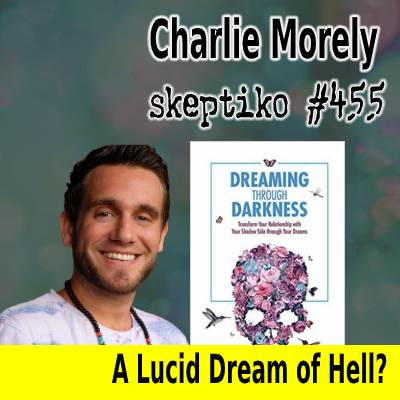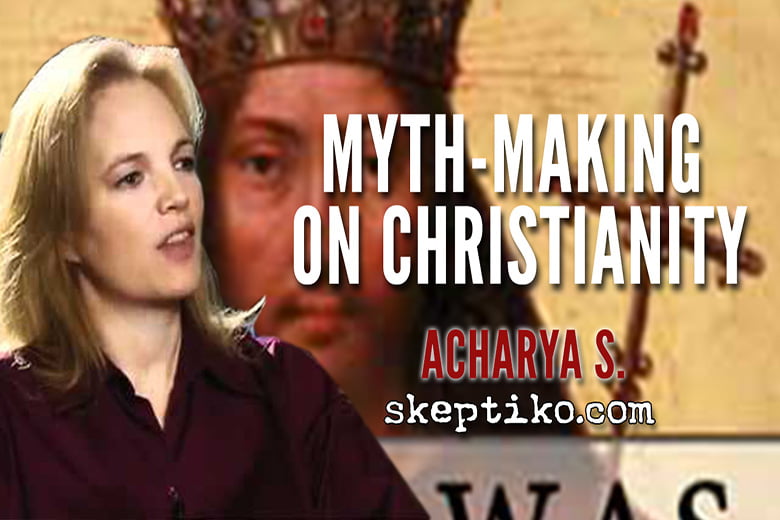Charlie Morely is an expert at lucid dreaming, and he's gone places most wouldn't dare to go. photo by: Skeptiko That's from...
Tag: buddhism
This Atheist has revolutionized Buddhism. Does consciousness science agree with his beliefs? |293|
Buddhist teacher Stephen Batchelor explores scientific materialism and secular Buddhism. photo by: Stephen Lasky I remember the first time I tried...
Is Christianity worth saving? |275|
Mark Vernon reveals how progressive Christians struggle with their tradition's past while holding on to the promise of spiritual transformation. ...
226. Acharya S. Examines the Effects of Myth-Making on Christianity
Click here for YouTube version Click here for forum discussion Click here to post comments on AlexTsakiris.com Interview with religion and mythology scholar Acharya S. (D.M. Murdock) examines the effects of early Christianity on other religions of the time. Join Skeptiko host Alex Tsakiris for an interview with Acharya S. author of, Who Was Jesus? Fingerprints of The Christ. During the interview Acharya talks about the religion and myths: Alex Tsakiris: One of the things that your work is really important in doing, and it’s something we didn’t talk enough about, is that it’s a really thorough analysis of the power and practices of cultish behavior, of power formation, and power manipulation. I think unless we really come to grips with this we can’t separate out what happened to these religions. On one hand we have these traditions and these myths and those that made the myths, and on the other hand we have the same characters that we see on the landscape today that say, “Hey, wait a minute. Maybe I can make a buck off of this. Maybe I can control things. Maybe I can make my group superior and win out over the other groups. And maybe I can use these myths to do it.” Unless we thoroughly understand that stuff, and at the same time appreciate the possibility that there is some genuine non-biological-robot, spiritual experiences that may be happening; until all that’s on the table, we can’t really get our arms around it. Acharya Sanning: What I’m just doing is writing a factual recitation of what has happened in these places. It’s very empowering to know this stuff. Also, when we were talking in the beginning about being in the middle between extremists on either side, this mythicism position that I am discussing which looks at supernatural beings in antiquity as mythical figures, not real people who landed on planet Earth and did a bunch of magic tricks. This is really a neutral position because you don’t have to believe in it and you don’t have to dismiss it. You don’t have to be a theist or an Atheist. You can be either one to enjoy this information. All I’m doing is collecting religious and mythological ideas from as far back as we can tell and putting them together and showing their influences on our thinking today. It doesn’t require any kind of belief or any kind of joining or any kind of control... (continued below) Acharya's Website Play It Listen Now: Download MP3 (63 min.) Read It: Today we welcome Acharya S. to Skeptiko. Acharya, whose real name is D. M. Murdock, is a first-rate Biblical scholar and an expert in religious studies and mythology. She is also the author of numerous books including, The Christ Conspiracy, Who is Jesus?, and Sons of God. She also runs a website that is absolutely chock-full of high quality articles and research on the topics we’re going to talk about today. That website is at www.truthbeknown.com. Acharya, it’s great to have you on Skeptiko. Thanks so much for joining me. Acharya Sanning: It’s nice to be here, Alex. Thanks for inviting me. I also have a blog at www.freethoughtnation.com. In fact, I have another one, www.stellarhousepublishing.com. You can search across all my websites and a forum. People are invited to ask questions of me in the forum, as well.
...155. Buddhist Meditation Teacher Shinzen Young on the Role of God in Meditation
Interview with Buddhist meditation teacher Shinzen Young explores different views of God. Join Skeptiko host Alex Tsakiris for an interview with Buddhist meditation teacher Shinzen Young. During the interview Shinzen discusses letting go of our simplistic view of God: Alex Tsakiris: Let’s talk about God for a minute and how that fits into meditation practice and the Buddhist spiritual path in a general sense. Shinzen Young: I love talking about this but I’m curious about your own thoughts about it. Alex Tsakiris: I guess I think it is important we don’t get too hung up on the language. We have to acknowledge our society is materialistic and atheistic. We have academics pulling us that way, and we have “science” pulling us that way. So, in the simplest form, when we’re talking about spirituality, we’re talking about God because we’re talking about something that transcends this materialistic, atheistic mindset. Shinzen Young: Okay. Traditionally in Buddhism, the historical Buddha negated certain ideas about God. So what you have is more Fundamentalist Buddhist teachers tend to shy away from the G word but a lot of other modern Buddhist teachers have no trouble with it whatsoever. But I’ve devoted my life to directing people to an experience that is beyond time and space and what I would call the source of consciousness, which is the source of experience and since self and world are known only through experience, I can point people to an experience that could be described as Source. And when a person contacts it, it fulfills all the things that people would want from God. Alex Tsakiris: I was recently listening to the Dali Lama give a lecture. He said that he tells seekers to look to their own tradition before turning to Buddhism. He’s emphatic about finding Buddhist teachings in Christianity and that Christianity can be this vehicle for creating a good heart and for a compassionate, loving person. More importantly, he goes out of his way to contrast that with the atheistic position and his implication is atheism leads nowhere. Shinzen Young: Well, it depends on what we want to call atheism. I think it is important to distinguish three things. One, becoming a better and better person, which might be described as improving the self. Two, realizing the source of the self. And three, the relationship between these two. I would say that the gold standard for mature spirituality is to see that the endeavor of going beyond the self, which is to attain an unlimited identity, and the endeavor of refining the small self. Shinzen's Website Play It: Download MP3 (46:00 min.) Read It: Today we welcome author, lecturer, and highly respected meditation teacher, Shinzen Young to Skeptiko. Shinzen, thank you for joining me today. Shinzen Young: My pleasure. Alex Tsakiris: Well, as you know, as a longtime meditation student—I really have to say student—and a longtime Yoga practitioner, I have a great respect for what you do and the importance of the teacher in this whole process we’re going to talk about today. So I of course want to start just by thanking you in general for the work that you do.
...63. Is the Dalai Lama an Atheist? Dr. Alan Wallace
Guest: Buddhist scholar and author of the upcoming Mind in the Balance, Dr. Alan Wallace discusses Buddhism and atheism. Download MP3 (44:31min,...
23. Buddhist Scholar and Meditation Researcher Says Skeptics Misinformed
Download Audio (MP3) (54:00min) Guest: Dr. B. Alan Wallace, Tibetan Buddhism scholar, explores his research into human consciousness, and how some...










